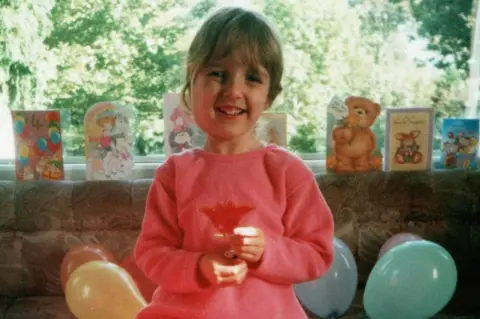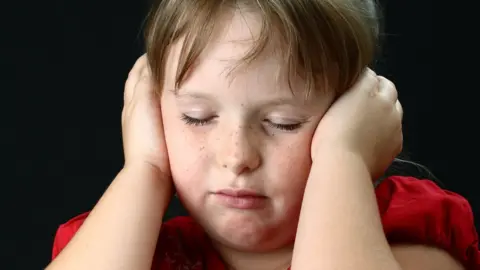The children who hear voices
One in 12 children is thought to persistently hear voices that are not there. Sometimes they tell them they are worthless. Now new research suggests the reaction of adults can affect the voices they hear in future.
"It's like being in a crowded room. All you can hear is all these multiple different voices having a go at you," Laura Moulding tells the BBC's Victoria Derbyshire programme.
The 21-year-old hears voices around her almost constantly, and has done since childhood.
"The voices are a combination of male and female voices, adults and children. One of them sounds like a Doctor Who monster.
"They just tell me I'm useless pretty much all the time."
Laura's experiences began when she was around three years old.
She was sitting on the stairs at her grandparents' home and heard a lion and bear from a children's television programme saying, "I'm coming to get you, I'm coming to get you", over and over again.
It was a terrifying experience, she says.
But when she first approached her parents, they assumed she was talking about imaginary friends.
She does not blame them for this, but did not try and talk to an adult about her voices for several more years.
 Laura Moulding
Laura MouldingIt is estimated that one in 12 children has persistent auditory hallucinations.
Researchers at Manchester Metropolitan University and the University of Manchester - in the first UK study into children who have such hallucinations and their parents - have found that the way in which people react to the child's experiences can influence what the voices are like in the future.
At 15, Laura found the hallucinations were becoming too much for her to deal with on her own.
Her mother took her to see a GP to seek treatment.
"I was self-harming and it was horrible moment for me," she says.
"I was struggling because the voices were so loud, so intimidating, so abusive, that it was something I couldn't cope with."
'Hearing mum's voice'
The research undertaken suggests that although many young people hearing voices will have a negative experience like Laura, others find the voices reassuring or even fun.
The researchers asked young people and their carers to fill out detailed questionnaires about their experiences.
"Tia" is 13. She does not want us to use her real name.
Her experiences with voices were quite different to Laura's.
She was seven when she first noticed she could hear things no-one else could.
"I used to hear my mum's voice quite a lot," she says.
She would also hear men shouting from a distance, and once heard electricity pylons singing.
 Getty Images
Getty ImagesThe voices would often make Tia laugh, but sometimes this led to her getting in trouble at school.
"One of my voices was just messing around with me, making me giggle too much," she says, leading her to swear at them to keep quiet.
Many children first start hearing voices after they have suffered some kind of trauma.
Tia's mother Alice - not her real name - has a chronic illness, and thinks the stress of her becoming sick affected Tia.
"[Tia's] been through so much, and this is how she is expressing it. That's what upset me most I think," Alice says.
Alice worked out that Tia was hearing voices after seeing her react to them.
She decided not to take her to a doctor and instead spoke with the support group the Hearing Voice Network.
'I don't miss them'
Dr Sarah Parry from Manchester Metropolitan University says her team's research has implications for how young people who hear voices should be treated.
"The children see the voices as part of themselves, so telling them the voices are a problem can add to a child's stress, which in turn can make the voices become more unpleasant."
At the moment in the UK, children and young people who ask for help for hearing voices can be referred down a number of different treatment pathways.
There are also a number of peer-support groups run by charities.
Dr Parry is seeking funding to set up a group specifically for young people who hear voices.
For Tia, one day the voices just went away on their own.
"I was like, 'Wait, there's nothing actually in my head - no-one speaking to me. I can just hear what I'm thinking'.
"I don't miss them."
Laura says she is now able to manage the voices with medication, or uses music to drown them out.
"I feel a lot stronger, a lot better in myself, even though the voices are still there," she says.
"They're not in control of me. I'm in control of them."
Watch the BBC's Victoria Derbyshire programme on weekdays between 09:00 and 11:00 on BBC Two and the BBC News Channel in the UK.
